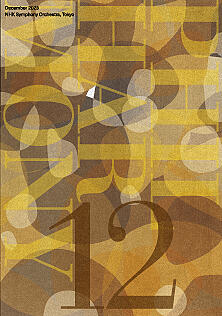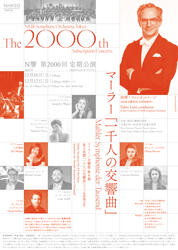- Home
- Concerts
- Subscription Concerts 2023-2024
- Program A
- No. 2000 Subscription (Program A)
No. 2000 Subscription (Program A)
NHK Hall
Google Map Seating Chart
Important Announcement
Program
Mahler / Symphony No. 8 E-flat Major, Symphonie der Tausend (Symphony of a Thousand)
Born in Bohemia in the Austrian Empire, Mahler was a truly epochal composer. All his symphonic works are the epitome of late Romanticism with their highly expressive and reflective nature, great length and colossal formation, the Eighth (1907) surely representing this monumentality the most. Although the composer disliked its skin-deep tag, Symphonie der Tausend (Symphony of a Thousand) given by an impresario for advertisement, the 1910 premiere conducted by Mahler reportedly required as many as around 1030 musicians.
The main factor of such scale is the presence of a mass of voices beside an extended orchestra and an organ, calling for eight solo singers, two mixed choruses and a children’s choir. This blending of symphony and human voice followed admittedly the later movement(s) of Beethoven’s Ninth, Mahler’s Second (Resurrection) and Third, but the latter’s Eighth was novel in that the vocal force plays a vital role throughout the work both as a carrier of lyrical content and as an essential component of the symphony’s structure.
Untraditionally, the Eighth is in two “parts” but not in several movements. The two are disproportionate and seemingly heterogeneous: Part 2 is more than twice as long as Part 1. The Latin text of Part 1 – the medieval hymn for Pentecost Veni, creator spiritus – is sacred and old, while the German text of Part 2 – from the closing scene of Goethe’s Faust (1808/1832) – is secular and more recent. However, the two parts actually treat the common Christian subject which is the redemption through divine love (Mahler, of Jewish origin, converted to Catholicism in 1897). Also, the both parts share some melodies/motifs conveying similar spiritual ideas to secure musical consistency of the entire work.
Part 1 is an enlarged sonata. As soon as the organ opens the work resounding the tonic chord of the main key (E-flat major), the double mixed choruses introduce the jubilant first theme on Veni, creator spiritus (Come, Creator Spirit). The gentler second theme is given by a soprano solo on Imple superna gratia, quae tu creasti pectora (Fill with grace from above, those hearts that you created).
Part 2 has an extended instrumental introduction in E-flat minor depicting “mountain gorges, forest, rocks, desert” inhabited by anchorites. The Allegro section let Angels (women’s chorus) carry Faust’s immortal soul which is then received by Blessed Boys (children’s choir). The Adagissiomo section features three penitents – Magna Peccatrix (soprano), Mulier Samaritana (alto), Maria Aegyptiaca (alto) – and a fourth penitent “formerly known as Gretchen” (Faust’s erstwhile lover, soprano) who pleads with Mater Gloriosa (the Virgin Mary) for Faust’s soul recalling the second gratia theme and then the first veni theme of Part 1: Mater Gloriosa (soprano) allows Gretchen to lead the soul heavenward saying “Komm! hebe dich zu höhern Sphären! (Come, rise up to higher spheres!) ...” Towards the end of the final “Mystical Chorus,” the massive sound is further fortified by the off-stage brass ensemble blowing the veni theme, to bring the positive, majestic closing in E-flat major.
[Kumiko Nishi]
*There is no intermission for this concert. Please note that you will not be able to take your seats after the performance starts.
Artists
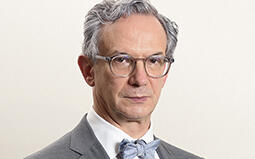 ConductorFabio Luisi
ConductorFabio Luisi
Fabio Luisi hails from Genoa. He is the Principal Conductor of the Danish National Symphony Orchestra and the Music Director of the Dallas Symphony Orchestra. He first conducted the NHK Symphony Orchestra in 2001, and in September 2022 he became Chief Conductor of the orchestra. In the 2022–23 season, his first season after assuming the post, Fabio Luisi conducted Verdi’s Requiem to commemorate his appointment in September. He has presented works of German and Austrian composers such as Beethoven, Brahms, Bruckner and R. Strauss as well as those of Franck and Saint-Saëns, Francophone composers, and with his conducting style full of passion and poetic sentiment, has captured the hearts of many of audience members. In August 2023, his tenure as Chief Conductor was extended by three years until August 2028.
He was General Music Director of the Opernhaus Zürich, Principal Conductor of the Metropolitan Opera in New York, Principal Conductor of the Wiener Symphoniker, as well as General Music Director of the Staatskapelle Dresden and the Sächsische Staatsoper, Artistic Director and Principal Conductor of the MDR Sinfonieorchester Leipzig, Music Director of the Orchestre de la Suisse Romande and Chief Conductor of the Tonkünstler Orchester. He is Music Director of the Festival della Valle d’Itria in Martina Franca (Apulia) and has appeared as guest conductor with numerous renowned ensembles, including the Philadelphia Orchestra, the Cleveland Orchestra, the Münchener Philharmoniker, the Filarmonica della Scala, the London Symphony Orchestra, the Royal Concertgebouw Orchestra, and the Saito Kinen Orchestra, while also conducting operas at world’s major opera houses. Important recordings include Verdi, Bellini, Schumann, Berlioz, Rachmaninov, Rimsky-Korsakov, Frank Martin, and Franz Schmidt, the largely forgotten Austrian composer. In addition, he has recorded various symphonic poems by Richard Strauss, and a lauded reading of Bruckner’s Symphony No. 9 with the Staatskapelle Dresden. His recordings of Wagner’s Siegfried and Götterdämmerung with the Metropolitan Opera won Grammy awards.
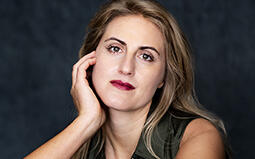 SopranoJacquelyn Wagner*
SopranoJacquelyn Wagner*
American soprano Jacquelyn Wagner, who sings in opera houses in Europe and the U.S., was born into a musical family, her father being a horn player of the Detroit Symphony Orchestra, and has studied at the Manhattan School of Music and the Oakland University of Michigan. She has won many international competitions including the International Singing Competition Francisco Viñas and the Renata Tebaldi International Voice Competition, and launched her career as an ensemble member of the Deutsche Oper Berlin, where she performed numerous roles, including the Countess in Le nozze di Figaro and Violetta in La Traviata.
In 2014, she came under the spotlight by singing the title role in R. Strauss’s Arabella (directed by Christof Loy) at the Netherlands Opera, and has since appeared at the world’s renowned opera houses and music festivals, including the Opéra de Paris, the Teatro alla Scala, the Operhaus Zürich, the Salzburg Easter Festival and Festival International d’Art Lyrique d’Aix-en-Provence. The roles she has sung in recent years include Eva in Die Meistersinger von Nürnberg conducted by Christian Thielemann, and Donna Anna in Don Giovanni conducted by Riccardo Muti. She has also appeared in many concerts, and this is her first collaboration with the NHK Symphony Orchestra. I am sure she will delight us with her clear and transparent voice in Mahler’s symphony.
[Junko Shibatsuji, music critic]
 SopranoValentina Farcas
SopranoValentina Farcas
Valentina Farcas is a Romanian soprano, captivating her audience with her lively, bright voice and powerful singing. Born to musical parents, who were both singers at the the Bucharest National Opera, she studied piano at the Bucharest Academy of Music, shifted to study vocal music and graduated from the Folkwang University of Arts in Essen, Germany. From 2002, she performed as a singer with the Berlin Komische Oper. She achieved international fame after singing the role of Blonde of Mozart’s Die Entführung aus dem Serail at the Salzburg Festival in 2006, and started to appear at opera houses across Europe. She has enjoyed a wide repertoire ranging from Susanna in Le nozze di Figaro, Adina in L’elisir d’amore, Gilda in Rigoletto, Sophie in Der Rosenkavalier, to Jenny in Weill’s The Rise and Fall of Mahagonny.
In orchestral concerts, she has worked with many renowned conductors such as Riccardo Muti and Christopher Hogwood. In September 2019, she appeared with the NHK Symphony Orchestra under Paavo Järvi as a soloist in R. Strauss’s Capriccio Final Scene, singing with delicate expression to move the hearts of audience. She worked with Fabio Luisi in Mahler’s Symphony No. 2 Resurrection by the Danish National Symphony Orchestra and by Orchestra Sinfonica Nazionale della Rai as recently as 2022, therefore expectations are high for her fascinating voice in Mahler’s 8th Symphony.
[Junko Shibatsuji, music critic]
 SopranoRie Miyake
SopranoRie Miyake
Tokyo-born Rie Miyake is one of Japan’s rising soprano singers. She graduated from Tokyo College of Music, completed her master's degree at the graduate school, and subsequently went to New York in 2006 to study under the tutelage of Dawn Upshaw, and in 2009, completed the master’s program at Bard Conservatory of Music in New York. In 2010, she won the Encouragement Award at the Fujisawa Opera Competition, and has appeared in numerous opera performances in Japan, singing the roles such as Frasquita in Carmen staged at Seiji Ozawa Music Academy, Marzelline in Fidelio at Nissay Theatre, Harry in Dai Fujikura’s Solaris, Nannetta in Tokyo Nikikai’s Falstaff and Flower Maiden in Parsifal at the New National Theatre. In particular, she came into the spotlight when she sang the title role of Stravinsky’s Le Rossignol at the New National Theatre in 2021, and opened up new horizons when she sang the role of Erica in Super Angels making headlines in co-starring with an artificial intelligence.
She also appeared in many orchestral concerts, including Saito Kinen Orchestra’s Mahler Symphony No.2 Resurrection under Fabio Luisi in August 2016. She first worked with the NHK Symphony Orchestra singing the role of Zerlina in Don Giovann (concert style) conducted by Paavo Järvi in September 2017, then in the orchestra’s 2022 Hotto Concert, she worked as both singer and narrator in Hikaru Hayashi’s Gauche the Cello Player. She will surely delight her audience with her beautiful high-pitched voice. She is a member of Nikikai.
[Junko Shibatsuji, music critic]
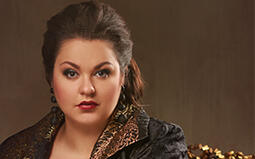 AltoOlesya Petrova
AltoOlesya Petrova
Olesya Petrova is a Russian mezzo-soprano with a powerful and intense voice. She was born in Leningrad, and graduated from the Rimsky-Korsakov St. Petersburg State Conservatory. She won 2nd prize at the 13th Tchaikovsky International Competition (vocal, female section) in 2007, and the 1st prize at the 2nd Paris Opera Competition in 2012. She was a soloist of the St. Petersburg Conservatory Opera and Ballet Theatre from 2007 to 2016 while in 2014, she made her debut at the Metropolitan Opera singing the role of Madelon in Andrea Chénier. From 2016, she belonged to the Mikhailovsky Theatre, playing the roles of Ulrika in The Masquerade, Santuzza in Cavalleria Rusticana, and the Countess in The Queen of Spades. Until now she has appeared in major theatres including the Deutsche Oper Berlin, the Operhaus Zürich, the Hamburgische Staatsoper, the Teatro Real of Madrid and the Gran Teatro del Liceu in Barcelona. In 2018, she marked her first appearance at the Bolshoi Theatre, performing the role of Polina in The Queen of Spades under the baton of Tugan Sokhiev. She has also been a featured guest at the Arena di Verona Festival in 2017, 2021, 2022, and 2023, where she sang her signature role, Amneris in Aida. She also made her Royal Opera House debut with this role in 2023. She has also been actively appearing in concerts. This is her second collaboration with the NHK Symphony Orchestra following September 2022 when she sang in Verdi’s Requiem under Fabio Luisi. The subtle expressions she brings to her singing will surely stand out in the performance.
[Junko Shibatsuji, music critic]
 AltoCatriona Morison
AltoCatriona Morison
Catriona Morison is a Scottish-German mezzo-soprano singing in a richly-expressive beautiful clear voice. She was born in Edinburgh, and after studying violin and viola and joining a local choir, she switched to study vocal music and studied at the Royal Conservatoire of Scotland and Berlin University of the Arts. She began performing with an opera studio in Weimar, and from 2016 to 2018, as a member of the ensemble of Oper Wuppertal, sang the roles of Nicklaus in The Tales of Hoffmann and Charlotte in Werther. After winning the BBC Cardiff Singer of the World Competition in 2017, she has continuously appeared in renowned opera houses and music festivals in Europe, including the Edinburgh International Festival, the Oper Köln, and the Hamburgische Staatsoper. In 2022, she sang Fricka in Das Rheingold at the Staatstheater Braunschweig and Nerone in Monteverdi’s L’incoronazione di Poppea at the Oper Wuppertal. In the field of orchestral concerts, she made her debut at the BBC Proms in 2019. She worked under Fabio Luisi singing Schönberg’s Gurre-Lieder with the Danish National Symphony Orchestra in September 2022. This is her first appearance with the NHK Symphony Orchestra. We look forward to her warm voice amplifying through Mahler’s Symphony.
[Junko Shibatsuji, music critic]
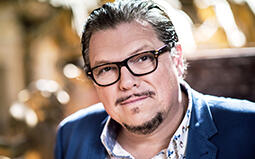 TenorMichael Schade
TenorMichael Schade
Celebrated as one of the leading tenors of our times, German-Canadian Michael Schade appears regularly on all of the important opera houses and concert stages of the world. Since his debut in 1991, opera and concert performances have taken him to the Verbier, Lucerne, and Salzburg Festivals, the Vienna, Hamburg and Berlin State Operas, the Metropolitan Opera and Canadian Opera Company. With his powerful yet delicate singing, he has performed almost all major roles of Mozart’s operas, and boasts a wide repertoire, including the works of Beethoven, R. Strauss and Dvořák. In addition to his opera career, Michael Schade devotes much of his artistry to concert and recitals. He appears regularly with the leading orchestras of the world, under such renowned conductors as Bolton, Harding, Jansons, P. Järvi, Muti, Nagano, Nézet-Séguin, Rattle, Thielemann, Ticciati and Young.
He first worked with the NHK Symphony Orchestra in September 2016 performing in Symphonie der Tausend (Symphony of a Thousand) under Paavo Järvi in the concert to commemorate the 90th anniversary of the orchestra’s founding, and in September 2019, he returned to the orchestra to sing the role of Florestan in Fidelio (concert style) conducted by Paavo Järvi to celebrate the 250th anniversary of the birth of Beethoven. In 2007 the Vienna State Opera has awarded Mr. Schade with the title Austrian Kammersänger. In 2017 Michael Schade was granted the title Officer to the Order of Canada (O.C.) and he has been a professor at the University of Music and Performing Arts Vienna since 2019.
[Junko Shibatsuji, music critic]
 BaritoneLuke Sutliff
BaritoneLuke Sutliff
Luke Sutliff from Denver, Colorado, is a rising baritone. He graduated from the Shepherd School of Music at Rice University and received a master’s degree from the university in 2021. He also studied at the Juilliard School of Music (graduating in 2019). He has appeared in many productions including Purcell’s Dido and Aeneas and Offenbach’s Orphée aux Enfers with Juilliard 415, Juilliard’s early music ensemble, Janáček’s Káta Kabanová and Bellini’s La Sonnambula in collaboration with the Metropolitan Opera’s Lindemann Young Artist Development Program. At the Santa Fe Opera, he sang the roles of Demetrius in Britten’s A Midsummer Night’s Dream in 2021, and the title role of Monteverdi’s Orfeo, arranged by Nico Muhly in 2023. Since 2021, as a member of the Houston Grand Opera Studio, he has performed in many operatic works, including Carmen, Dialogue of the Carmelite, Tosca, and Romeo and Juliet. He has been scheduled to sing the roles of Figaro in Seattle Opera’s The Barber of Seville, and Demetrius in A Midsummer Night’s Dream by Atlanta Opera. He is an up-coming young singer attracting the world attention. This is his first collaboration with the NHK Symphony Orchestra.
[Junko Shibatsuji, music critic]
 BassDavid Steffens
BassDavid Steffens
David Steffens, a bass from Bad Reichenhall, Germany, graduated from the Mozarteum University Salzburg in 2011, where he attended master classes with Dietrich Fischer-Dieskau. The same year, he made his debut at the Salzburg State Theatre as Bartolo in Mozart’s Le nozze di Figaro. He later joined the Oper Stuttgart as an exclusive singer, performing the roles such as Sarastro in Die Zauberflöte, King Heinrich in Lohengrin, Escamillo in Carmen, and many others. He has also appeared at Sächsische Staatskapelle Dresden, Teatro Real de Madrid and Volksoper Wien. In 2018, he made a debut at the Salzburg Festival singing in Salome, and in 2021, appeared as Masetto in Don Giovanni (directed by Castellucci). Recent and upcoming highlights include his house debut at the Berlin State Opera as Ochs auf Lerchenau / Der Rosenkavalier, Hunding / Die Walküre in Stuttgart and König Marke / Tristan und Isolde at Opéra de Lille.
In orchestral concerts, he has worked with renowned conductors including Simon Rattle, Zubin Mehta, Theodor Currentzis, and with Fabio Luisi / the Danish National Symphony Orchestra in Schoenberg’s Gurre-Lieder (September 2022). With his flexible bass range, he stands as a forerunner among the next generation of basses. This is his first appearance with the NHK Symphony Orchestra.
[Junko Shibatsuji, music critic]
 ChorusNew National Theatre Chorus
ChorusNew National Theatre Chorus
The New National Theatre Chorus started its activities in April 1998 as the chorus to work with the New National Theatre, Tokyo (NNTT), which was inaugurated in October 1997. Its members are all excellent singers and actors, and their rich voices and ability to harmonize well with players on stage are highly regarded by operatic singers, conductors, stage directors they work with, as well as by critics both at home and abroad. In addition to working with the New National Theatre, the chorus has worked with Japan’s major orchestras as well as those overseas including the Royal Concertgebouw Orchestra, the Berliner Philharmoniker and the Cleveland Orchestra to expand its scope of its activities.
The chorus first worked with the NHK Symphony Orchestra in 2004 for Götterdämmerung staged at the NNTT, and participated in Fidelio (concert style) performed by the NHK Symphony Orchestra under Paavo Järvi to mark the 250th anniversary of Beethoven’s birth in 2019. Apart from those, the chorus has often performed in the orchestra’s subscription concerts, including Mozart’s Mass in C minor staged in November 2019 and Mahler’s Symphony No. 2 Resurrection in January 2020. Their first collaboration with Fabio Luisi was in September 2022 when they sang in Verdi’s Requiem. Their impressive performance full of power is still fresh in our memory.
[Junko Shibatsuji, music critic]
 Children ChorusNHK Tokyo Children Chorus
Children ChorusNHK Tokyo Children Chorus
The NHK Tokyo Children Chorus (formerly known as Tokyo Broadcasting Children’s Chorus Group), was formed in March 1952 for the purpose of consolidating educational programs as well as programs for children on NHK for the healthy growth of the minds and spirits of children. In addition to appearing on NHK TV and radio, it has frequently worked with major Japanese orchestras and engaged in international exchanges with overseas chorus groups. It has also commissioned choir works to Japanese composers, and introduces many of them in Japan and overseas. In 2022, the chorus marked the 70th anniversary of its founding. The chorus has won numerous awards both at home and abroad, including 1st prize in the children’s category of the Centennial of Zoltán Kodály’s Birth Competition and the grand prix in the competition’s general category. In 2009, the chorus took part in a concert along with the NHK Symphony Orchestra to celebrate the 50th anniversary of the marriage of the Emperor and Empress and the 20th anniversary of the Emperor’s enthronement. It often performs operatic works including those staged at the New National Theater in Tokyo. In 2023, it participated in Tokyo Nikikai’s Turandot. Since 2010, it has often worked with the NHK Symphony Orchestra, and sang Orff’s Carmina Burana at the NHK Music Festival 2018, and Tchaikovsky’s ballet suite The Nutcracker in December 2018.
[Junko Shibatsuji, music critic]
* Artists have been changed from initially scheduled Elena Stikhina (Soprano).
Download
Ticket
Program A
No. 2000 Subscription (Program A)
NHK Hall
Google Map
Seating Chart
Single Tickets Release Date
Pre-sales for Subscribers:Thursday, October 26, 2023
*about subscribers
Sale to General Public:Sunday, October 29, 2023
Price
| S | A | B | C | D | E | |
|---|---|---|---|---|---|---|
| Ordinary Ticket | 12,000 | 10,000 | 8,000 | 6,500 | 5,000 | 3,300 |
| Youth Ticket | 6,000 | 5,000 | 4,000 | 3,200 | 2,500 | 1,600 |
Seating chart Enlarge Print PDF
*tax included
*Subscribers receive a 10% discount (Available at NHKSO WEB Ticket and N-Kyo Guide)
*For wheelchair-accessible seats, please refer to the N-Kyo Guide
Youth Tickets
Youth Tickets are great options for those of 25 years old and younger
Subscription tickets
Release Date
ANNUAL SUBSCRIPTION TICKETS
Mon., July 17, 2023 10:00am
[For Subscribers: Sun., July 9, 2023 10:00am]
SEASONAL SUBSCRIPTION TICKETS (WINTER)
Tue., Oct. 17, 2023 10:00am
[For Subscribers: Thu., Oct. 12, 2023 10:00am]
Where to buy
NHKSO WEB Ticket | Saturday, December 16 (In English / Seats not selectable)
NHKSO WEB Ticket | Sunday, December 17 (In English / Seats not selectable)
NHKSO WEB Ticket (In Japanese only / Seats selectable)
N-Kyo Guide (Purchase by telephone only)
Other Ticket Agents
*Repertoire, conductor, soloists and program order are subject to change without notice.
*Pre-school children are not allowed in the concert hall

